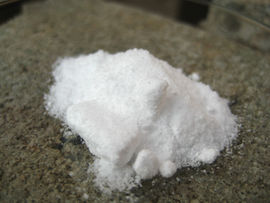Difference between revisions of "Sodium metabisulfite"
Diachrynic (Talk | contribs) |
|||
| (One intermediate revision by one other user not shown) | |||
| Line 7: | Line 7: | ||
| OtherNames = Sodium disulfite<br>Sodium metabisulphite<br>Sodium pyrosulfite<br>Sodium pyrosulphite | | OtherNames = Sodium disulfite<br>Sodium metabisulphite<br>Sodium pyrosulfite<br>Sodium pyrosulphite | ||
<!-- Images --> | <!-- Images --> | ||
| − | | ImageFile = | + | | ImageFile = Sodium_metabisulfite.jpg |
| − | | ImageSize = | + | | ImageSize = 270 |
| ImageAlt = | | ImageAlt = | ||
| ImageName = | | ImageName = | ||
| Line 145: | Line 145: | ||
===Storage=== | ===Storage=== | ||
| − | Sodium metabisulfite should be kept out of hot or humid environments and away from water and acids while indoors. Best way to store it is in resealable bags. | + | Sodium metabisulfite should be kept out of hot or humid environments and away from water and acids while indoors. Best way to store it is in plastic resealable bags. |
===Disposal=== | ===Disposal=== | ||
Latest revision as of 12:10, 26 September 2019

| |
| Names | |
|---|---|
| IUPAC name
Sodium metabisulfite
| |
| Other names
Sodium disulfite
Sodium metabisulphite Sodium pyrosulfite Sodium pyrosulphite | |
| Properties | |
| Na2S2O5 | |
| Molar mass | 190.107 g/mol |
| Appearance | White solid |
| Odor | Pungent, sulfur dioxide |
| Density | 1.48 g/cm3 |
| Melting point | 170 °C (338 °F; 443 K) (decomposition begins at 150 °C) |
| Boiling point | Decomposes |
| 45.1 g/100 ml (0 °C) 65.3 g/100 ml (20 °C) 81.7 g/100 ml (100 °C) | |
| Solubility | Reacts with acids Very soluble in glycerol Slightly soluble in ethanol |
| Hazards | |
| Safety data sheet | Sigma-Aldrich |
| Flash point | Non-flammable |
| Related compounds | |
| Related compounds
|
Potassium metabisulfite |
| Except where otherwise noted, data are given for materials in their standard state (at 25 °C [77 °F], 100 kPa). | |
| Infobox references | |
Sodium metabisulfite, also known as sodium pyrosulfite is an inorganic compound, used as a preservative and reducing agent. Its chemical formula is Na2S2O5.
Contents
Properties
Chemical
When mixed with water or heated sodium metabisulfite releases sulfur dioxide, decomposing to sodium sulfite in the process.
- Na2S2O5 → Na2SO3 + SO2
The same thing happens when a strong acid is added.
- Na2S2O5 + 2 HCl → 2 NaCl + H2O + 2 SO2
Sodium metabisulfite itself can be used as a reducing agent as well as the sulfur dioxide it produces. Perhaps the most famous example of this is the reduction of chloroauric acid to produce very pure elemental gold. It can also be added to a solution of copper(II) chloride to precipitate copper(I) chloride.
The little-known copper compound Chevreul's salt can be produced by boiling a mixture of copper(II) sulfate and sodium metabisulfite solutions. Both of these reactions should be done outside or in a fume hood as sulfur dioxide is released, though to a much lesser extent in the case of Chevreul's salt.
Physical
Sodium metabisulfite is a white salt. It has a faint sulfur dioxide smell.
Availability
Sodium metabisulfite is available as a wine preservative, either alone or mixed with potassium metabisulfite, product known as Campden tablets. The metabisulfite salt is usually stored in an air-tight bag inside the outer paper or plastic bag, to keep it dry and reduce the sulfur dioxide smell. Some stump removers, namely the one manufactured by Bonide (found at Home Depot), consist of sodium metabisulfite. Other stump removers may be potassium nitrate or other chemicals, so it is important to read the label/MSDS.
Preparation
Sodium metabisulfite can be prepared by evaporating a solution of sodium bisulfite saturated with sulfur dioxide:
- 2 HSO3- ⇌ H2O + S2O52-
Projects
- Precipitate gold from gold compounds
- Generate sulfur dioxide for use as a reducing agent
- Bleach neutralization
- Chevreul's salt synthesis
Handling
Safety
Sodium metabisulfite may cause allergic reactions to people who are sensitive to sulfites. Sulfur dioxide is very irritating and unpleasant as well as toxic.
Storage
Sodium metabisulfite should be kept out of hot or humid environments and away from water and acids while indoors. Best way to store it is in plastic resealable bags.
Disposal
Sodium metabisulfite can be neutralized with bleach and then poured down the drain.